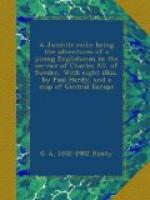“Going as you do as a Scotchman, there is, I hope, little danger, especially if you are received into a Scottish household.”
The journey passed without incident, until they were within a few miles of Warsaw, when Charlie, after formally thanking Baron Seckers for the protection his escort had afforded him, fell behind with his servant. Several parties of armed men had been met with, but they knew better than to interfere with the little body of Swedish cavalry; while, in the towns through which they passed, the baron was respectfully received as the envoy of the dreaded King of Sweden.
“Is there another gate to the city, on this side of the town, beside that by which the Swedes will enter? If so, it would be as well to use it, so that there should seem to be no connection between us and them,” said Charlie.
There was another gate, and by this they rode into Warsaw, at that time a city of far greater importance than it is at present. The gate was unguarded, and they passed through without question. The citizens were talking excitedly in groups, evidently discussing the question of the arrival of the Swedish envoy, and the chances of peace; and no attention was paid to the travellers, whose appearance denoted them to be persons of no importance. Richly-attired nobles, in costumes of almost oriental magnificence, galloped through the streets on splendid horses, scattering the groups of citizens, and paying no attention whatever to the angry murmurs that followed them.
Charlie stopped at a small inn, and there the horses were put up. Stanislas made inquiries for the shop of Allan Ramsay, mentioning that his employer was a relation of the Scottish merchant, and had come out to be with him, until he had learned the language.
“The Scots know their business,” the landlord grumbled. “They and the French and the Jews, together, have their hand in everyone’s pocket. They buy the cattle and grain of the peasants, for what they choose to give for them, and send them out of the country, getting all the profits of the transaction; while, as to the nobles, there is scarce one who is not deep in their books.”
“Still, you could not do without them,” Stanislas said. “There must be somebody to buy and to sell, and as the nobles won’t do it, and the peasants can’t, I don’t see that the foreigners are to be blamed for coming in and taking the trade.”
“That is true enough,” the landlord admitted reluctantly. “Still, there is no doubt the country is kept poor, while, between them, these men gather up the harvest.”
“Better that than let it rot upon the ground,” Stanislas said unconcernedly; and then, having obtained the name of the street where several of the Scottish traders had places of business, he and Charlie started on foot. They were not long in finding the shop with the sign of the merchant swinging over the door.
“You had better wait outside, Stanislas, while I go in and see the master. No; if he is not in the shop, his men will not understand me, so come in with me till you see that I have met him, and then go back to the inn for the night. Whether I join you there will depend upon the warmth of my welcome.”




